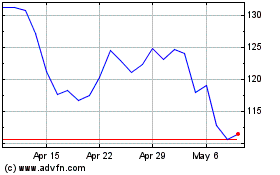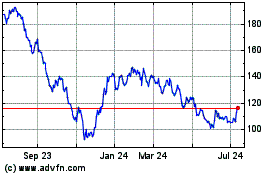Illumina Launches Firm to Pursue Gene-Based Cancer Blood Test
January 10 2016 - 9:20PM
Dow Jones News
SAN FRANCISCO—Illumina Inc., seeking to build on its strength in
DNA sequencing, is launching a new company that will develop and
market a test to detect genetic evidence of cancer in the
blood.
The San Diego maker of gene-sequencing machines said Sunday it
is forming the company, called Grail, with a group of other
investors, marking the latest bet that so-called liquid biopsies
will become a major tool for detecting, diagnosing and managing
treatment of cancer.
The test will be designed to screen people who have no cancer
symptoms and detect disease at its earliest stages when the chance
to cure it is highest, said Jay Flatley, Illumina's chief
executive, who is also chairman of Grail.
Illumina is the majority owner of the company, which is backed
by more than $100 million in its initial financing. Arch Venture
Partners is also a lead investor, with additional participation
from Bezos Expeditions, Bill Gates and Sutter Hill Ventures, Mr.
Flatley said. The company announced the launch on the eve of the
annual J.P. Morgan Healthcare Conference here.
Researchers have long known that evidence of tumors lurks in the
blood, either in the form of circulating tumor cells or in
fragments of DNA that are shed from tumor cells. That has raised
hopes for a blood test that could reliably enable doctors and
patients to detect and monitor the disease without painful and
sometimes misleading tissue biopsies that are commonly used to
diagnose cancer. But advances in technology, including the ability
to cheaply sequence tumor DNA, are just beginning to make such
tests feasible.
Grail's test will focus on detecting cancer-associated mutations
in DNA fragments to screen people for evidence of disease. The
company will have a "preferential economic relationship with
Illumina" and its DNA sequencing expertise, Mr. Flatley said.
That will make it possible to perform the especially detailed
analyses of DNA fragments needed to develop and validate the test
and to market it at an affordable price. He estimated the company
will have to sequence between 100,000 to 300,000 human genomes at
exceptionally deep levels to develop a reliable test.
There are big hurdles. Broad screening programs for prostate and
breast cancer, for instance, often raise suspicions when no cancer
is present—a false-positive result—or find cancer that will never
cause problems yet lead patients to undergo further tests and
procedures that come with harmful side effects.
Mr. Flatley said a blood test avoids some such problems because
unlike, for example, suspicious findings from mammography, which
can have a variety of causes, "we are actually measuring mutations
from cancer cells." It is "a direct measure of the cancer itself,"
he said.
But he acknowledged that it is crucial to show the test "doesn't
have a high false-positive rate," and that it can distinguish
between potentially aggressive cancers and those likely to have no
health consequences. The company plans to work closely with
regulators and insurers in developing the test, said Mr. Flatley,
adding that the price will have to come in under $1,000 initially
and come down further after that.
He said Grail will spend the next year refining the test before
testing it in clinical trials beginning in 2017. If all goes well,
a test to detect evidence of any cancer–what he termed a
"pan-cancer screening test" —could be on the market by 2019.
(END) Dow Jones Newswires
January 10, 2016 21:05 ET (02:05 GMT)
Copyright (c) 2016 Dow Jones & Company, Inc.
Illumina (NASDAQ:ILMN)
Historical Stock Chart
From Mar 2024 to Apr 2024

Illumina (NASDAQ:ILMN)
Historical Stock Chart
From Apr 2023 to Apr 2024
